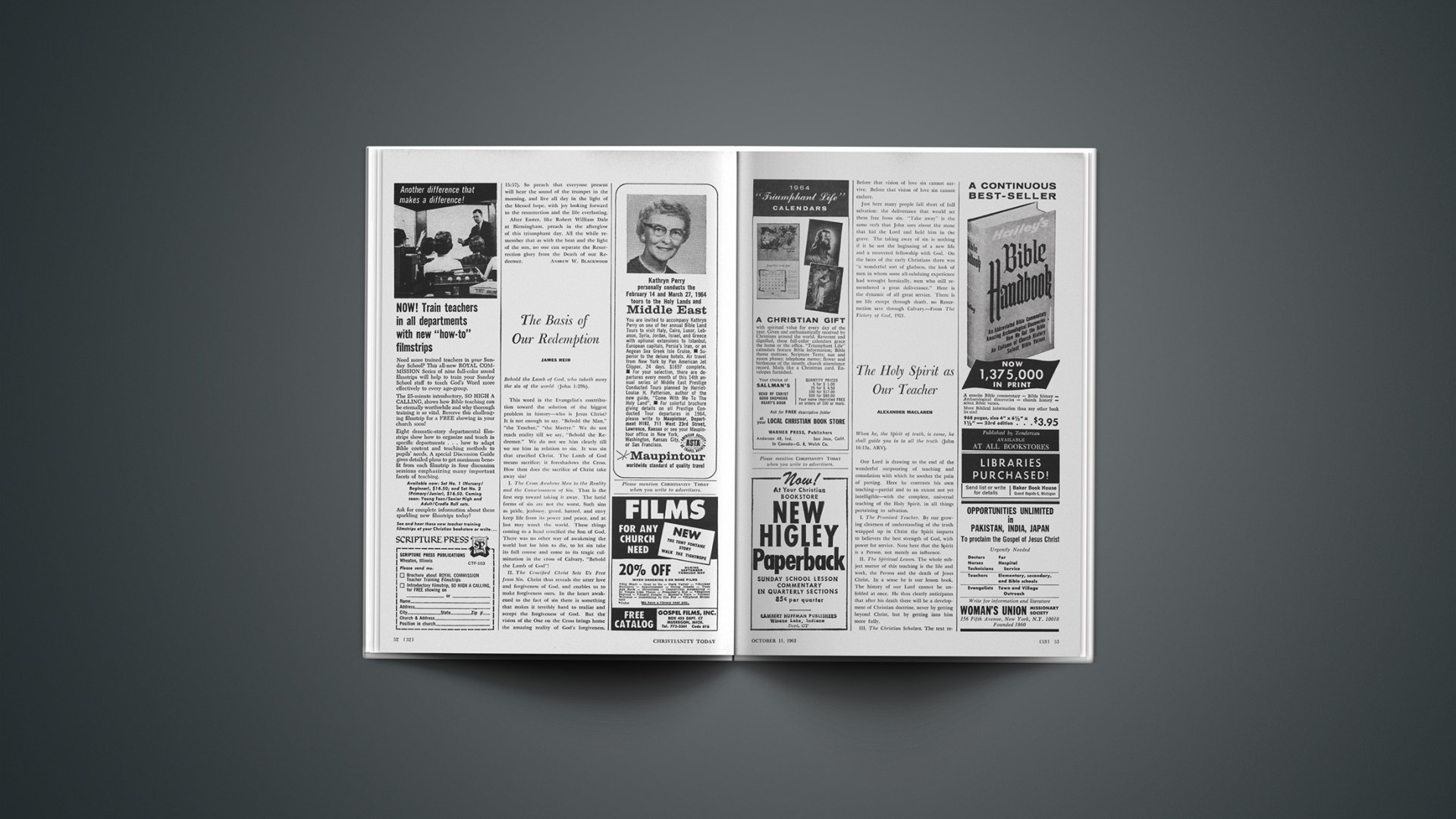While preaching from an Old Testament book, make ready to deal with John’s Gospel. Here good commentaries abound. I prefer Westcott, either the one based on Greek, or the one on English. After a devotional study, dodging no difficulties, prayerfully select from the gathered riches the paragraphs most certain to meet local needs today.
In December have the layman read Isaiah 28–35. Then preach on “The Repose of a Settled Faith” (28:16), and “The Christ of the Old Testament” (35:1). On the third Sunday, introduce “The Greatest Book in the Bible” (John 20:31). Then “The Christ Before the First Christmas” (1:1). In this wondrous verse let the stress fall on the nouns. Next, “The Heart of the Christmas Gospel” (1:14). At the National Museum in Cairo the curator once took up an inconspicuous vase with no historic value. Reaching inside he turned on a light that caused the alabaster vessel to shine with glory from God. So do here with the Incarnation.
“The Glory of Christ’s Personality” (2:11). At a wedding feast: The Glory of Christ’s Human Nature—Social Sympathies—Transforming Power. Glory here means the outshining of God’s goodness and grace. At the start waste no time in telling what the layman has prayerfully read at home, and has heard the pastor read. Preach about the Lord in present tenses. Not a post-mortem! “The Golden Text of the Bible” (3:16). Most ministers shy away from preaching about such a supreme text. Is this fair to the Book, or the hearer? Always choose the noblest text at hand, and treat it royally.
“The Eloquence of Christian Experience” (4:42). “Eternal Life Here and Now” (6:47). Our Lord says that life everlasting begins when a man is born again. “The Way to Know the Will of God” (7:17, first ten words). As in “Every Man’s Life a Plan of God,” by Horace Bushnell, stress the divine more than the human. Keep to the singular. “The Sinlessness of Our Saviour” (8:46a). A theme as neglected today as it is vital forever. This Gospel truth has been set to music: “There was no other good enough to pay the price of sin.”
“The Creed of Christian Experience” (9:25). “The Secret of Christian Usefulness” (10:10b, Moffatt). The translator once told a young friend never to read his version from the pulpit. Too colloquial! “Christ’s Concern for the Sick” (11:3b), a timely message in late winter. “The Christ of Magnetic Power” (12:32). Already too many suggestions for the time in view! Save Sundays for the still more important half of the Gospel (13–20), with an inspired postscript (21) by the Apostle John.
“The Gospel in a Towel” (13:4). Our Lord delighted to preach in terms of common things at home, such as bread, salt, and a towel. “The Secret of the Untroubled Heart” (14:1). Or else, “The Peace that Christ Bestows” (14:27). Be careful about the order here: Peace with God—With Others, One by One—With Yourself. The most important first, as the cause. What does first mean? As for climax, which of the three persons most interests the average man? In a group picture, which person do you look at first? Yourself! Human nature! For the average man, interesting, more interesting, most interesting. Climax! It is difficult to improve on Holy Writ!
“The Blessing of Friendship with the Lord” (15:15). “The Holy Spirit as Our Teacher” (16:13). “The Meaning of Life Eternal” (17:3). As in Deuteronomy and Hosea, in St. John to know God means to have had a transforming experience. Here, ideally, life everlasting has already begun, at least a little. Increasingly it ought now to mean knowing Him better, loving him more, and becoming more like him day by day, so as later to be with him where beyond these voices there will be everlasting peace in the presence of our God.
On Palm Sunday, “The Coming of Christ to Our City,” or community (12:13b). On this day preach about him as he appears in the Passion Play at Oberammergau. There the action all begins on Palm Sunday, under the deepening shadows of the Cross. Locally, some persons will not again appear in church until Easter. When will they hear the Gospel as it centers in Golgotha? As at the Passion Play, on Palm Sunday show the deepening shadows of the Cross. Then have five week-night sermons about the Christ of the Cross. Is there salvation and life everlasting in any other?
“The Gospel of Easter Triumph” (1 Cor. 15:57). So preach that everyone present will hear the sound of the trumpet in the morning, and live all day in the light of the blessed hope, with joy looking forward to the resurrection and the life everlasting.
After Easter, like Robert William Dale at Birmingham, preach in the afterglow of this triumphant day. All the while remember that as with the heat and the light of the sun, no one can separate the Resurrection glory from the Death of our Redeemer.










